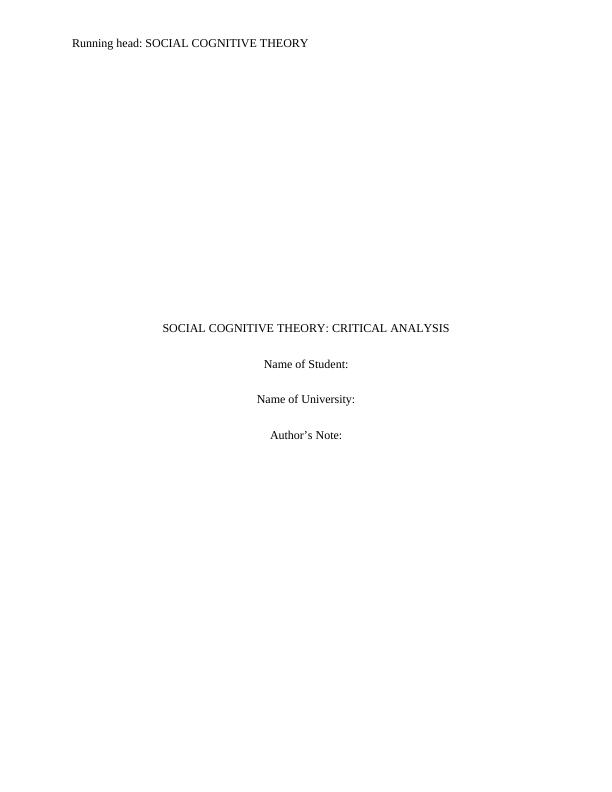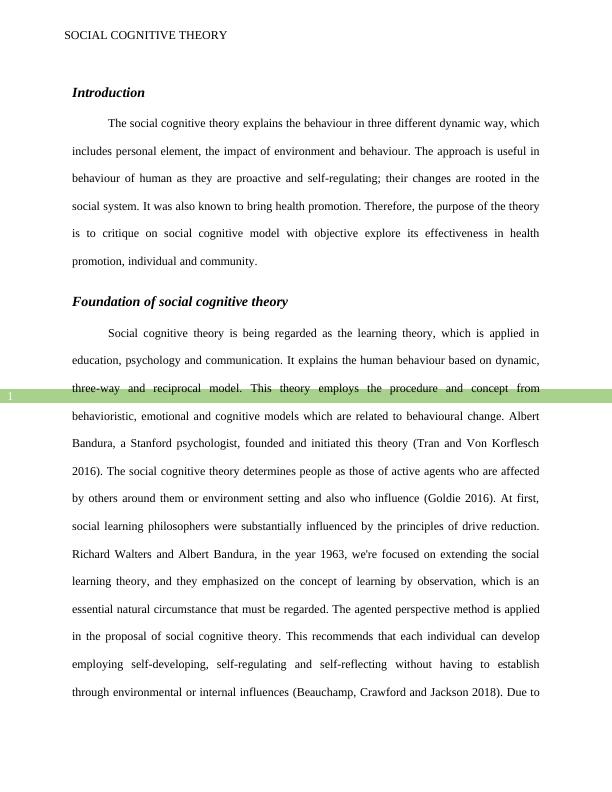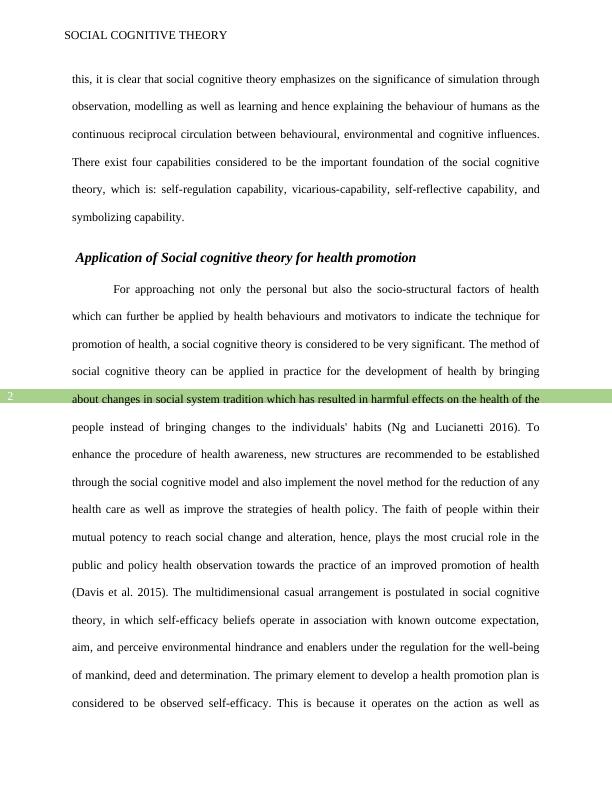Social Cognitive Theory: Critical Analysis
Added on 2022-12-30
7 Pages1736 Words1 Views
Running head: SOCIAL COGNITIVE THEORY
SOCIAL COGNITIVE THEORY: CRITICAL ANALYSIS
Name of Student:
Name of University:
Author’s Note:
SOCIAL COGNITIVE THEORY: CRITICAL ANALYSIS
Name of Student:
Name of University:
Author’s Note:

SOCIAL COGNITIVE THEORY
1
Introduction
The social cognitive theory explains the behaviour in three different dynamic way, which
includes personal element, the impact of environment and behaviour. The approach is useful in
behaviour of human as they are proactive and self-regulating; their changes are rooted in the
social system. It was also known to bring health promotion. Therefore, the purpose of the theory
is to critique on social cognitive model with objective explore its effectiveness in health
promotion, individual and community.
Foundation of social cognitive theory
Social cognitive theory is being regarded as the learning theory, which is applied in
education, psychology and communication. It explains the human behaviour based on dynamic,
three-way and reciprocal model. This theory employs the procedure and concept from
behavioristic, emotional and cognitive models which are related to behavioural change. Albert
Bandura, a Stanford psychologist, founded and initiated this theory (Tran and Von Korflesch
2016). The social cognitive theory determines people as those of active agents who are affected
by others around them or environment setting and also who influence (Goldie 2016). At first,
social learning philosophers were substantially influenced by the principles of drive reduction.
Richard Walters and Albert Bandura, in the year 1963, we're focused on extending the social
learning theory, and they emphasized on the concept of learning by observation, which is an
essential natural circumstance that must be regarded. The agented perspective method is applied
in the proposal of social cognitive theory. This recommends that each individual can develop
employing self-developing, self-regulating and self-reflecting without having to establish
through environmental or internal influences (Beauchamp, Crawford and Jackson 2018). Due to
1
Introduction
The social cognitive theory explains the behaviour in three different dynamic way, which
includes personal element, the impact of environment and behaviour. The approach is useful in
behaviour of human as they are proactive and self-regulating; their changes are rooted in the
social system. It was also known to bring health promotion. Therefore, the purpose of the theory
is to critique on social cognitive model with objective explore its effectiveness in health
promotion, individual and community.
Foundation of social cognitive theory
Social cognitive theory is being regarded as the learning theory, which is applied in
education, psychology and communication. It explains the human behaviour based on dynamic,
three-way and reciprocal model. This theory employs the procedure and concept from
behavioristic, emotional and cognitive models which are related to behavioural change. Albert
Bandura, a Stanford psychologist, founded and initiated this theory (Tran and Von Korflesch
2016). The social cognitive theory determines people as those of active agents who are affected
by others around them or environment setting and also who influence (Goldie 2016). At first,
social learning philosophers were substantially influenced by the principles of drive reduction.
Richard Walters and Albert Bandura, in the year 1963, we're focused on extending the social
learning theory, and they emphasized on the concept of learning by observation, which is an
essential natural circumstance that must be regarded. The agented perspective method is applied
in the proposal of social cognitive theory. This recommends that each individual can develop
employing self-developing, self-regulating and self-reflecting without having to establish
through environmental or internal influences (Beauchamp, Crawford and Jackson 2018). Due to

SOCIAL COGNITIVE THEORY
2
this, it is clear that social cognitive theory emphasizes on the significance of simulation through
observation, modelling as well as learning and hence explaining the behaviour of humans as the
continuous reciprocal circulation between behavioural, environmental and cognitive influences.
There exist four capabilities considered to be the important foundation of the social cognitive
theory, which is: self-regulation capability, vicarious-capability, self-reflective capability, and
symbolizing capability.
Application of Social cognitive theory for health promotion
For approaching not only the personal but also the socio-structural factors of health
which can further be applied by health behaviours and motivators to indicate the technique for
promotion of health, a social cognitive theory is considered to be very significant. The method of
social cognitive theory can be applied in practice for the development of health by bringing
about changes in social system tradition which has resulted in harmful effects on the health of the
people instead of bringing changes to the individuals' habits (Ng and Lucianetti 2016). To
enhance the procedure of health awareness, new structures are recommended to be established
through the social cognitive model and also implement the novel method for the reduction of any
health care as well as improve the strategies of health policy. The faith of people within their
mutual potency to reach social change and alteration, hence, plays the most crucial role in the
public and policy health observation towards the practice of an improved promotion of health
(Davis et al. 2015). The multidimensional casual arrangement is postulated in social cognitive
theory, in which self-efficacy beliefs operate in association with known outcome expectation,
aim, and perceive environmental hindrance and enablers under the regulation for the well-being
of mankind, deed and determination. The primary element to develop a health promotion plan is
considered to be observed self-efficacy. This is because it operates on the action as well as
2
this, it is clear that social cognitive theory emphasizes on the significance of simulation through
observation, modelling as well as learning and hence explaining the behaviour of humans as the
continuous reciprocal circulation between behavioural, environmental and cognitive influences.
There exist four capabilities considered to be the important foundation of the social cognitive
theory, which is: self-regulation capability, vicarious-capability, self-reflective capability, and
symbolizing capability.
Application of Social cognitive theory for health promotion
For approaching not only the personal but also the socio-structural factors of health
which can further be applied by health behaviours and motivators to indicate the technique for
promotion of health, a social cognitive theory is considered to be very significant. The method of
social cognitive theory can be applied in practice for the development of health by bringing
about changes in social system tradition which has resulted in harmful effects on the health of the
people instead of bringing changes to the individuals' habits (Ng and Lucianetti 2016). To
enhance the procedure of health awareness, new structures are recommended to be established
through the social cognitive model and also implement the novel method for the reduction of any
health care as well as improve the strategies of health policy. The faith of people within their
mutual potency to reach social change and alteration, hence, plays the most crucial role in the
public and policy health observation towards the practice of an improved promotion of health
(Davis et al. 2015). The multidimensional casual arrangement is postulated in social cognitive
theory, in which self-efficacy beliefs operate in association with known outcome expectation,
aim, and perceive environmental hindrance and enablers under the regulation for the well-being
of mankind, deed and determination. The primary element to develop a health promotion plan is
considered to be observed self-efficacy. This is because it operates on the action as well as

End of preview
Want to access all the pages? Upload your documents or become a member.
Related Documents
Social Cognitive Theory Assesment Reportlg...
|7
|1625
|7
The internal and external stimuluslg...
|7
|1776
|13
Personal, Environmental, Behavioural Factors from Bandura’s Social Cognitive Theory Modellg...
|3
|1182
|24
Social Cognitive Theorylg...
|7
|1822
|35
SOCIAL COGNITIVE THEORY ESSAY 2022lg...
|7
|1934
|32
Social Cognitive Theory and its Application in a Case Study of Royal Bournemouth and Poole Hospitallg...
|8
|1845
|274